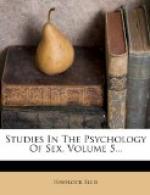qualities, and not by the presence of any special
principle having a selective action on the sexual
sphere. A beefsteak is probably as powerful
a sexual stimulant as any food; a nutritious food,
however, which is at the same time easily digestible,
and thus requiring less expenditure of energy for its
absorption, may well exert a specially rapid and
conspicuous stimulant effect. But it is not
possible to draw a line, and, as Aquinas long
since said, if we wish to maintain ourselves in a
state of purity we shall fear even an immoderate
use of bread and water.
More definitely aphrodisiacal effects are produced by drugs, and especially by drugs which in large doses are poisons. The aphrodisiac with the widest popular reputation is cantharides, but its sexually exciting effects are merely an accidental result of its action in causing inflammation of the genito-urinary passage, and it is both an uncertain and a dangerous result, except in skillful hands and when administered in small doses. Nux vomica (with its alkaloid strychnia), by virtue of its special action on the spinal cord, has a notably pronounced effect in heightening the irritability of the spinal ejaculatory center, though it by no means necessarily exerts any strengthening influence. Alcohol exerts a sexually exciting effect, but in a different manner; it produces little stimulation of the cord and, indeed, even paralyzes the lumbar sexual center in large doses, but it has an influence on the peripheral nerve-endings and on the skin, and also on the cerebral centers, tending to arouse desire and to diminish inhibition. In this latter way, as Adler remarks, it may, in small doses, under some circumstances, be beneficial in men with an excessive nervousness or dread of coitus, and women, in whom orgasm has been difficult to reach, have frequently found this facilitated by some previous indulgence in alcohol. The aphrodisiac effect of alcohol seems specially marked on women. But against the use of alcohol as an aphrodisiac it must be remembered that it is far from being a tonic to detumescence, at all events in men, and that there is much evidence tending to show that not only chronic alcoholism, but even procreation during intoxication is perilous to the offspring (see, e.g., Andriezen, Journal of Mental Science, January, 1905, and cf. W.C. Sullivan, “Alcoholism and Suicidal Impulses,” ib., April, 1898, p. 268); it may be added that Bunge has found a very high proportion of cases of immoderate use of alcohol in the fathers of women unable to suckle their infants (G. von Bunge, Die Zunehmende Unfaehigkeit der Frauen ihre Kinder zu Stillen, 1903) while even an approximation to the drunken state is far from being a desirable prelude to the creation of a new human being. It is obvious that those who wish, for any reason, to cultivate a strict chastity of thought and feeling would do well to avoid alcohol altogether, or only in its lightest forms and in moderation.




